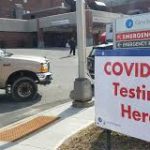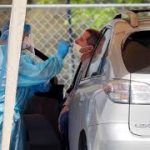“We’re All Anxious, Sweetie.”
The sign said, “Keep your windows rolled up. Pull up slowly to the first table, put your car in park, and wait for instructions.” A masked and energetic man came to the driver’s side of my car and held a printed sign up to my window which read: “Please call me on this number and I  will give you instructions.” I called and he began, “Hold your printed registration form up to the window please” followed by a few questions that required yes or no responses. Then, he tied a strip of pink plastic on my side mirror to identify me as having been registered to proceed in the long line of cars inching their way toward the testing area. On a rainy Thursday in Indianapolis, I became one of thousands of volunteers to be tested for the presence of the virus using nasal swabs.
will give you instructions.” I called and he began, “Hold your printed registration form up to the window please” followed by a few questions that required yes or no responses. Then, he tied a strip of pink plastic on my side mirror to identify me as having been registered to proceed in the long line of cars inching their way toward the testing area. On a rainy Thursday in Indianapolis, I became one of thousands of volunteers to be tested for the presence of the virus using nasal swabs.
The entire process was well organized, and each stop on the way was staffed by people wearing masks whose eyes showed them to be caring, concerned professionals working to ensure that everything would go smoothly. When I made the turn into the testing area, it was like coming upon a small, remote village of people heavily dressed in bulky layers of personal protective equipment, with large, bubble-domed helmets trailing hoses down their backs that swayed as they moved, making them look like science-fiction creatures. They were aided by watchful and masked police who, in deadly earnest, were keeping the lines of cars moving carefully through the test area. I began to feel overwhelmed seeing just how thoroughly the testers needed to protect themselves from this lethal virus, and from those of us in our cars. The gravitas of their mission, and my role in it, hit home and I felt anxiety creeping up into my chest. The space inside my car suddenly felt tight and confining.
A policeman waved at me to pull up to a marked line and then gestured for me to stop, turn off the car’s engine, and wait to be approached. A fully garbed tester came from behind a row of tables and walked over, signaling for me to lower my window. She reached inside to hand  me a brightly colored paper describing how to get my test results, and another outlining a description of the study, and two tissues “because the swab might make your eyes water.” Her manner was kind, compassionate, and professional. In quick movements, she instructed me to lean my head back, and then swabbed both nostrils vigorously. She withdrew the swabs, placed them into a tube and then into a large plastic bag that she sealed. She said, “There, we’re done. I hope it wasn’t too uncomfortable.” I replied, “Compared to what the doctors and nurses are going through, it was no trouble at all.” A faint smile crossed her face, and I felt encouraged to add, “Thank you for your service. I don’t know why but I felt so anxious coming here today.” With kind eyes, she quietly responded, “We are all anxious, sweetie. You have a blessed day” and withdrew, returning to her table as I restarted my car and drove out into the rain.
me a brightly colored paper describing how to get my test results, and another outlining a description of the study, and two tissues “because the swab might make your eyes water.” Her manner was kind, compassionate, and professional. In quick movements, she instructed me to lean my head back, and then swabbed both nostrils vigorously. She withdrew the swabs, placed them into a tube and then into a large plastic bag that she sealed. She said, “There, we’re done. I hope it wasn’t too uncomfortable.” I replied, “Compared to what the doctors and nurses are going through, it was no trouble at all.” A faint smile crossed her face, and I felt encouraged to add, “Thank you for your service. I don’t know why but I felt so anxious coming here today.” With kind eyes, she quietly responded, “We are all anxious, sweetie. You have a blessed day” and withdrew, returning to her table as I restarted my car and drove out into the rain.
A sense of weary release, and gratitude for her kindness and compassion swept over me, and I began to weep. “This virus is deadly”, I thought, “but she overcomes her daily fear in order to collect these vital nasal samples while not forgetting her humanity.” In the brief moment we shared, I felt seen by this kind stranger, and deeply touched by the profound experience of witnessing love in action. I needed to cry and I reached out to a dear friend who is a nurse I met when we went through hospice volunteer training together. I knew she would understand the mix of my emotions, and would say comforting things to help me process my feelings; by the time I arrived home, I felt tired but cared for.
The experience may not have been designed to help volunteers deal with the grief that we are all going through during this pandemic, but in my case, it was beneficial in that way. I am a life coach, a celebrant, and a writer and in each of these roles, I deal with grief frequently, including my own. We are all grieving so many losses that have unfolded since January; losses that have come unbidden, including the losses of loved ones, of personal freedom, of income, and the loss of our most basic human needs to hug, touch, and hold one another.
Being in the study was a way of letting go of some of my stress, and the ongoing sense of helplessness that I have felt in the face of the virus. It provided a way for me to do something concrete, something more than worry, or simply talk about, a disease that is causing so much fear, despair, and suffering. So, I am grateful that I could participate. I am grateful that the brave woman who tested me had not lost her sense of humanity in spite of a pandemic. In this meaningful experience, I am reminded of the words of President Franklin D. Roosevelt: “Courage is not the absence of fear, but rather the assessment that something else is more important than fear.”
At a time when all of us are experiencing high levels of stress and anxiety, science gives us a simple and effective way to strengthen our emotional well-being: to help ourselves,the best place to begin is by helping others.
The research on resilience shows that when we have a sense of clear purpose and give support to others, we increase our ability to bounce back from adversity. There is something called a “helper’s high” identified in research that shows volunteering, donating money, or just thinking about donating time or money, can release feel-good chemicals to stimulate the part of the brain that produces pleasure. Volunteers have been shown to have a lower level of the stress hormone, cortisol, on those days when they donate their time and talent. Lastly, feeling responsible for other people, having what is called a “felt obligation” to sacrifice for others, acts as a protective factor in life and buffers our bodies against the detrimental physical effects of distressing conditions and events.
In a time of social distancing, we might wonder how best can we help one another? The good news is that you don’t have to take big steps, or sweeping actions; small gestures and support can be helpful to the giver and receiver. Donating money; making masks; calling our elderly neighbors to see if they are doing okay; giving advice, or lending a listening ear, all of these actions can contribute and make a difference in the lives of others. Just getting outside of ourselves, and finding meaning and purpose in something that is greater than us, can bring a deep sense of comfort, a sense of control, and help us manage our own emotions.
In closing, I hope you stay well, do good, and don’t forget to wash your hands!
Every Wednesday we will be publishing Pandemic Weekly for, we hope, not too long. We invite you to submit your thoughts, essays, poems or songs. Please send to info@aftertalk.com.
Every Thursday we publish “AfterTalk Weekly.” We invite readers to submit their own poem, essay, or suggestions for publication. If you are a therapist you are welcome to extend this invitation to your clients as well. Please send your submission to info@aftertalk.com
